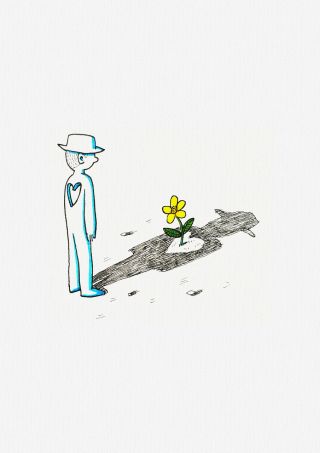Relationships
Saying the Unsayable: The Psychology of Poetry
An interview with poet David Whyte.
Posted March 6, 2023 Reviewed by Michelle Quirk
Key points
- Poetry can arouse profound emotions and lead to transformation.
- At times, all of us use the psychology of poetic language in everyday speech.
- The practice of attentive curiosity is key to increasing revelation.
Humans spend most of their waking hours playing with what novelist Rudyard Kipling called “the most powerful drug used by mankind”—words. In the laboratories of our minds, we sort, slice, and string words, before breathing life into them with our voices.
At the hands of poets—the laboratory artisans—even the most quotidian of words can cast spells. Poets enjoy an intimate acquaintance with the medicinal shelves of language. They tinker with doses, stir flasks, and study the tastes and textures of the elements so that when their words are drunk by others, they are as precise and truthful as they are potent.

Why has poetry moved humans for millennia? Research in psychology offers various hypotheses: poetry arouses profound emotions and their psychophysiological signatures (goosebumps, tears), sends readers on a meaning-finding quest, gifts aesthetic pleasure, and engages the brain’s primary reward circuitry. Poems can even provide a “holding environment” that facilitates healing, and they have been used in clinical settings as part of cognitively based psychotherapies.
A share of poetry’s magic emerges by virtue of encountering validation of our innermost, unarticulated experiences, the relief and gratification of finally being seen. “Reading a poem can feel as if the world comes and finds us for the first time,” says poet David Whyte. This reconnaissance between self and world, maybe even “as a much larger identity than we held until that moment” is how poetry, according to Whyte, can prompt transfiguration.
Here are Whyte's own words about this:
MP: How do words help poets “say the unsayable”?
DW: Words have a deep physical substrate inside us that stems from our past and even our original experiences with them. Poetry can stir the memory of words that reside in our bodies in different ways.
Poetry touches the moveable essence of things—words name life without stopping it. It is pure experience turned into pure expression. It restores the aliveness and the elemental nature of the very thing it’s describing, which may have become obscured by the veils we habitually create between ourselves and the world.
MP: Can we use words in everyday life to achieve some of poetry’s powerful effects?
DW: When we speak of “using” words, it’s as if we are commoditizing experience. The language itself bars us from apprehending words as an elemental force. Instead, we must live the words.
From time to time, all of us speak in poetic diction. For instance, when someone has to deliver the poignant news of death or loss to someone else, they’ll often unconsciously employ poetry. They will choose their words carefully so that there are no defenses against them. They will speak the words in an invitational manner, often repeating them in three different ways, which is a poetic form in many cultures. They will leave silence between words, to allow them to be received by the other person.
MP: What are the telltale signs that we are engaging with poetic language?
DW: The most common diagnostic is a physical sense of gratitude—both from speaking and hearing poetry. It’s even possible to feel grateful when being told bad news in the right way. You can also feel gratitude when you read a good poem and, suddenly, someone describes something that you’ve never been able to articulate before about your own life. Or when the words express a dynamic that you had refused to notice until that moment. The other diagnostics of using poetic language are exhilaration and a wish to learn more.
MP: "Beauty is the harvest of presence, the evanescent moment of seeing or hearing on the outside what already lives far inside us.” How does poetry expound beauty?
DW: Poetry’s invitation is to bring the qualities we feel inside into conversation with what is occurring in the outside world. When those two come together, we experience it as beauty. There is always something beautiful about the truth in poetry, even when it’s difficult and frightening. Even in the asymmetry—when the world outside is beautiful, and, yet, we feel as if we’re dying inside. A poem extends the invitation to make the correspondence between inner and outer in that asymmetry. The poetic art is about living at the frontier between things. That can mean not choosing language too early in the experience, until it is the experience itself. Or it can mean speaking what’s blossoming between seemingly separate qualities.
MP: "A good poem looks life straight in the face, unflinching, sincere, equal to revelation through loss or gain.” What does life look like when you look straight at its face?
DW: It’s an experience that happens along a spectrum of increasing depth. When you first begin to look life in the face—whether through poetry, meditation, or even parenting—every deep experience seems to break your heart. Everything seems to tear away at the edges of your identity. As you get used to the natural cycle of breakdown, disappearance, and then reappearance and growth, you begin paying such deep attention, that what you’re looking at disappears.
The poetry of transcendence and joy invites a shift of identity to the frontier where, as I often say, ‘what you think is you meets what you think is other than you’ and there’s not someone finding or being found. Almost always, however, that’s not where we start. Poet Rainer Maria Rilke’s early writing, for example, is all about grief and distance. But after years of practicing the deeper states of attention that arise through the writing of poetry, and also what it bequeaths one in simply walking around for the rest of the day after writing, Rilke wrote The Sonnets To Orpheus, which are sheer celebration of joy (he writes about a tree growing inside his ear, so that everything he hears makes his internal life rooted and flourishing.) Rilke’s life is a good example of that process of increasing revelation, transfiguration, and finding the language that carries the experience fully.
MP: What changes in the psyche to allow for a more joyous experience of life?

DW: It’s the practice of attentive curiosity. At the heart of many Zen koans is the student’s enquiry: “There’s something wrong with my mind,” and the teacher’s coded reply, which is in effect: “There’s nothing wrong with your mind, except the fact that your mind thinks there’s something wrong with itself.” We have to be able to observe the part of our minds that looks for something both wrong with the world and with ourselves.
From an evolutionary point of view, the strategic mind has been a good servant to us in our survival. Its job is to maintain the illusion that we know what’s going on, and to help us survive from day to day, by keeping us worried about everything that hasn’t been done. Yet, it can never enter fully into the house of belonging or joy. Our unhappiness lies in asking the strategic mind to deliver us happiness: if I only organize my life properly, if only I get this or that, if only I write the next great poem about grief. Underneath that lies a much deeper faculty that tries to belong to the world in the largest way it can. To me, this faculty of belonging is the soul.
"Admit" by David Whyte
Admit,
Your distant love
affair
is with yourself
and that
no one
can play harder
to get.
MP: Is everyone a poet in their own right?
DW: Although not all of us grow up putting paint onto canvas or sculpting marble, everyone uses language. Everyone has thresholds in their lives where they put words together in dramatic ways that break through their own defenses and the defenses of the one who is listening. Therefore, I’d say, yes. Thanks to the intimacy of language, almost everyone has the ability to recognize poetry and, therefore, has the possibility of writing or speaking a few lines of good poetry—sometimes, even without being aware of it.
MP: Where can true belonging be found most unconditionally?
DW: When we say I belong somewhere, it’s never a static platform that we’ve arrived on. We are always in the process of arrival. In English, the word belonging has a lovely coincidence of carrying the energy of being and longing. It’s as if we are connected to the gravitational pull of those words, and what we feel we most belong to and desire in life.
The ancient truth is that belonging can only be found in this moment, because there’s no other place for us to live in. It sounds abstract. Yet, all human relationships and love grow from this moment and our ability to be present. Belonging may also take the form of a place. But, often, even in that form of familial love, life whisks us off to somewhere else. Since there are many places I love in the world— Yorkshire, the West of Ireland, Spain, the Pacific Northwest—I have a constellation of belonging. I believe true belonging gifts you a sense of wilderness so that you could make your home wherever you find yourself.
"The House of Belonging" by David Whyte (an excerpt)
This is the bright home
in which I live,
this is where
I ask
my friends
to come,
this is where I want
to love all the things
it has taken me so long
to learn to love.
This is the temple
of my adult aloneness
and I belong
to that aloneness
as I belong to my life.
There is no house
like the house of belonging.
Many thanks to David Whyte for his time and insights. David Whyte is an internationally renowned poet and author. He has written 11 books of poetry, three books of prose, and Consolations, an acclaimed book of essays.
References
Johnson-Laird, P. N., & Oatley, K. (2022). How poetry evokes emotions. Acta Psychologica, 224, 103506.
Wassiliwizky, E., Koelsch, S., Wagner, V., Jacobsen, T., & Menninghaus, W. (2017). The emotional power of poetry: Neural circuitry, psychophysiology and compositional principles. Social Cognitive and Affective Neuroscience, 12(8), 1229-1240.
O'Sullivan, N., Davis, P., Billington, J., Gonzalez-Diaz, V., & Corcoran, R. (2015). “Shall I compare thee”: The neural basis of literary awareness, and its benefits to cognition. Cortex, 73, 144-157.
Belfi, A. M., Vessel, E. A., & Starr, G. G. (2018). Individual ratings of vividness predict aesthetic appeal in poetry. Psychology of Aesthetics, Creativity, and the Arts, 12(3), 341.
Alfrey, A., Field, V., Xenophontes, I., & Holttum, S. (2021). Identifying the mechanisms of poetry therapy and associated effects on participants: A synthesised review of empirical literature. The Arts in Psychotherapy, 75, 101832.
Hunter, D., & Sanderson, S. (2007). Hold me; heal me: Providing a holding environment through the use of poetry therapy. Journal of Poetry Therapy, 20(3), 153-158.




